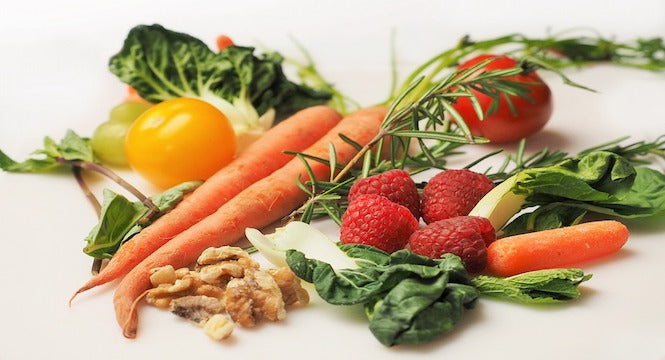Your Cart is Empty
FREE SHIPPING on US orders over $45. Save 25% With Code TAKE25 at checkout.
FREE SHIPPING on US orders over $45. Save 25% With Code TAKE25 at checkout.

It's no secret that what you eat has a direct effect on your overall health, but what about your skin? Your skin is your body's largest organ, and it is absolutely affected by your diet. But maybe not in the way you think.
A slice of pizza won't necessarily cause pimples, and (good news!) you probably don't need to completely cut out chocolate either. In this article we will delve into what research tells us about the relationship between your diet and your skin.
Not that long ago, it was believed that many dermatological conditions had no relation to diet whatsoever. But recent research studies have shown that diet does in fact play a key role in some conditions.
Acne is a good example, as it was thought formerly that dietary intervention had no impact on the condition. Newer research, however, revealed that diet, particularly the Western diet, is correlated to increased skin inflammation and acne.
A typical Western diet is rich in refined carbohydrates, which are high on the glycemic index. Studies found that this type of diet can influence sebum production. Excessive sebum (oil) production is often a catalyst for acne.
Diet can also be linked to systemic disease like psoriasis.
While there isn’t anything we can do about getting older, some studies show that a healthy diet can help your skin look younger.
For example, omega-6 polyunsaturated fatty acids play a key role in the structural integrity of your skin, and help to form a barrier on the skin against free radicals.
Studies have shown that higher dietary intake of essential fatty acids is associated with a more youthful skin appearance, with less skin wrinkling in sun exposed skin.
Research also shows that a diet rich in fruits and vegetables can reduce the risk of skin cancer. Certain nutrients, including vitamins C and E, beta-carotene, and lycopene, are able to protect the skin from damaging UV rays and free radicals.
Cocoa flavonoids found in dark chocolate can also help enhance the skin's hydration and boost the skin’s defense against damage from UV radiation from the sun. Green tea, applied topically and consumed orally, has a similar effect and promotes overall skin health.
So, should you be eating a high-protein, low-carb diet for better skin health? Or a diet low in fat? Or maybe it’s time to go with a carb-lovers diet? Or the Mediterranean diet? What about eating strictly vegetarian? Or should you go vegan? There are endless options, but which diet is best for healthier skin?
Unfortunately, there's no one best diet that will give everyone perfect, glowing skin. Each of our bodies have different needs and sensitivities, so a part of it will always be listening to what feels best for you However, these are a few foods you might consider moderating in order to have healthier skin: